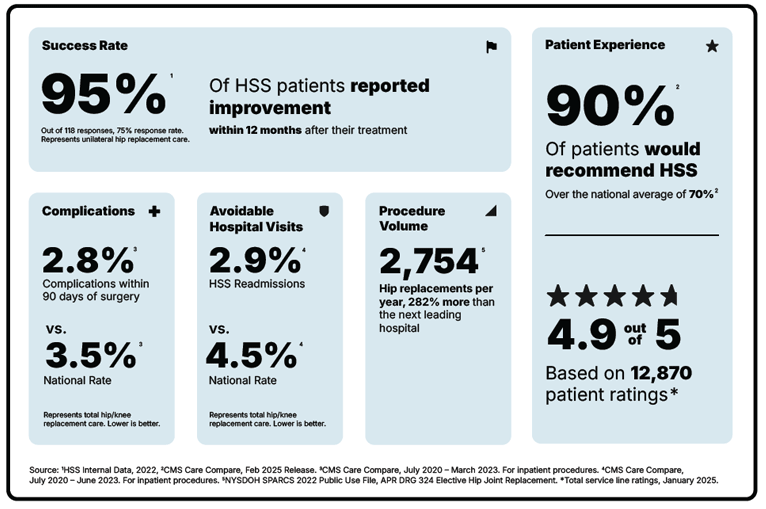Here’s What to Know if You Think You Need a Hip Replacement
Hip replacement (also called total hip arthroplasty) is a surgery that’s done to treat osteoarthritis of the hip. This is a condition that generally occurs as people get older, when the cartilage that provides cushioning between the bones in the hip joint begins to degenerate and wear away.

During hip replacement surgery portions of your hip joint that have been damaged are removed and replaced with plastic, metal or ceramic parts. People often hesitate to have a hip replacement operation because they are scared to have any kind of surgery, but most people heal quickly and see a big improvement in their lives.
Here are a few things to keep in mind if you think you may need a hip replacement.
Just because you have hip pain doesn’t mean you have osteoarthritis
There are several causes of hip pain, including arthritis, bursitis and tendonitis. In people who have osteoarthritis, wear and tear causes breakdown of the cartilage − the material at the ends of bones that provides cushioning in the joints. The loss of cartilage leads to pain and inflammation.
Pain due to arthritis in the hip is usually felt in the groin or thigh rather than the buttock. It may radiate down your thigh to your knee. Swelling in the joint can also make it harder for you to move your hip. Some people with arthritis in the hip eventually have symptoms that are severe enough that they would benefit from a hip replacement.
Nonsurgical options can be effective, up to a point
Usually, we start by treating the symptoms of hip osteoarthritis with acetaminophen or anti-inflammatory drugs. You may also benefit from physical therapy or steroid injections. Depending on your pain levels, you may be able to put off surgery for several years by using these approaches to improve your symptoms.
My goal and the goal of the other hip replacement surgeons at HSS is to try to manage patients’ pain for as long as possible without surgery. But if you get to the point where the pain is keeping you up at night or you’re not leaving the house because it hurts too bad to walk, then it’s probably time to fix it.
Hip replacement can help you get back to what you love to do
Some people go to pretty significant extremes to avoid having their hip replaced. They may pursue unproven treatments that aren’t well regulated. Unfortunately, we don’t have anything that truly reverses the process, or even slows it down, once the hip joint has begun to degenerate.
The good news is that the techniques used in hip replacement surgery have improved greatly in recent years. Overall, recovery is very rapid. Most importantly, hip replacement surgery can eliminate your pain and get you back to doing what you like to do.
Why you should choose HSS for hip replacement
Hip replacement is a surgery focused on reducing pain and getting you back to the activities you love. But not all hospitals achieve the same results. Some are more reliable than others. With the help of the HSS Hospital Reliability Scorecard, you can make sure you're asking the critical questions to find the hospital that's right for you. Understanding these data points will help you make the best decision for your care: See hospital reliability data


